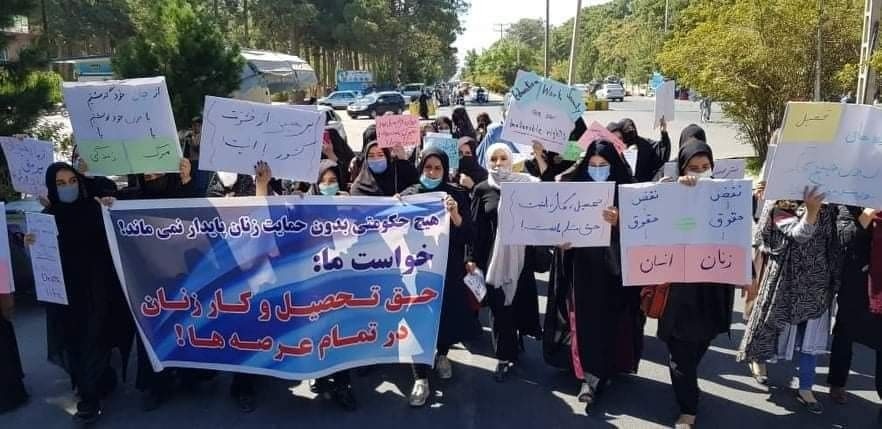No Driving Licences To Afghan Women: Taliban
May 5, 2022 | Pratirodh Bureau
FILE PHOTO: Afghan women march holding placards as they take part in a protest against the Taliban in Herat on September 2, 2021 (AFP)
The Taliban regime in Afghanistan has stopped issuing driving licenses to women in Kabul and other provinces, media reports said. The ban comes at a time when the country suffers from a devastating humanitarian crisis, with an acute shortage of food and other essential supplies.
Before the Taliban takeover, women in Afghanistan could be seen driving in some of the major cities of the country including Kabul. However, the Taliban has now stopped distributing driving licenses to women, local media said.
Notably, the situation of human rights in Afghanistan has worsened since the collapse of the Afghan government and the Taliban’s return to power in August last year. Although the fighting in the country has ended, serious human rights violations continue unabated, especially against women.
In a recent decree, the Taliban regime in Afghanistan banned girls from attending school above grade sixth leading to worldwide condemnation. The leaders of the outfit have since said that the move was made because of an apparent “shortage of teachers” and that the right of girls to study beyond grade sixth will be restored “shortly”.
Psychologists have said that the Afghan girl students banned from going to schools by the Taliban, are suffering mental stress due to this move, reported local media. “When someone likes something and is prevented from doing it, it causes mental stress and anxiety. The girls who like education and are not allowed to engage in it undergo mental pressure,” ToloNews quoted Jamshid Rasa, a psychologist, as saying. Validating the claims, the girl students expressed how the closing of their schools is causing them mental health trouble and they are counting the seconds until the schools will be reopened.
“I am very disappointed that the schools were not reopened. It is the right of every girl to have access to education,” said Saeeda, a student in grade 10 who aspires to become a doctor in future. “We seriously don’t know what type of situation this is. We should go to school to make our future,” the media outlet quoted Setayish, another student, as saying.
Meanwhile, according to sociologists, barring girls from education can pave the ground for early and forced marriages in the country.
“The banning of girls from going to secondary and high school will cause a surge in forced marriages,” said Bahauddin Baqayi, a sociologist.
Notably, the Taliban’s decision to ban female students above grade six from going to school has drawn widespread criticism at the national and international levels.
Further, the Taliban regime has curtailed women’s rights and freedoms, with women largely excluded from the workforce due to the economic crisis and restrictions. According to HRW, women and girls are blocked from accessing health care as well. Reports suggest that women and girls facing violence have no escape route. Allowing girls into schools and other educational institutes has been one of the main demands of the international community. The majority of countries have refused to formally recognize the Taliban amid worries over their treatment of girls and women and other human rights issues.
Meanwhile, Afghanistan is grappling with a serious humanitarian crisis, as according to international assessments, Afghanistan has now the highest number of people in emergency food insecurity in the world, with more than 23 million in need of assistance, and approximately 95 per cent of the population having insufficient food consumption. (with ANI inputs)
